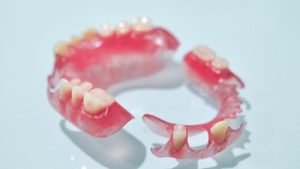Sore gums can make everyday activities like eating and speaking unexpectedly uncomfortable. If you are adjusting to dentures or facing ongoing irritation, understanding the cause and solution is essential to improve your comfort and oral health.
While short-term relief is helpful, long-lasting results often come from personalised care and early professional support. This guide breaks down practical options that can help soothe your gums while ensuring your dentures function as they should.
Why Do Dentures Sometimes Cause Discomfort?
Not every denture experience is smooth from day one. Even well-made appliances can create gum pressure or soreness under certain conditions.
Ill-Fitting Dentures and Sore Spots

Trapped Food and Irritation
Food particles caught under a denture can cause gum irritation, especially when not cleaned thoroughly. Bacteria thrive in these hidden areas, increasing the risk of soreness and infection. Using a proper denture cleanser and rinsing with warm water after meals reduces this risk significantly. Daily attention to denture hygiene can prevent painful outcomes.
Common Oral Conditions That Contribute
Denture stomatitis is one example of how inflammation under a denture can lead to ongoing pain. Often linked to poor hygiene or fungal overgrowth, it presents as red or swollen tissue. Underlying health conditions, such as diabetes or dry mouth, can also heighten discomfort. Knowing the root cause helps you choose the right solution.
How to Relieve Denture Pain at Home
While long-term care comes from your prosthetist, there are supportive steps you can take at home to improve comfort.
Using Denture Adhesive for Stability
A good denture adhesive helps reduce friction between the appliance and your gums. It creates a layer of cushioning that can decrease pain during chewing or talking. For those still adjusting to new dentures, this can make a noticeable difference in daily wear. Just ensure you follow the application instructions closely.
Choosing Foods That Soothe, Not Irritate
When gums are already sore, stick to soft foods that require minimal chewing. Mashed vegetables, soups, and smoothies can be helpful during this period. Salty foods, on the other hand, may worsen inflammation. A few tips include avoiding crunchy textures and adding cool ingredients like yoghurt for extra relief.
Supporting Gums with Natural Soothing Options
Aloe vera gel has been found to help soothe gum swelling thanks to its anti-inflammatory properties. Applying a small amount to the affected area may bring temporary relief. Some people also find comfort in sipping a turmeric latte, which contains curcumin, a compound linked to inflammation control. While these are not cures, they can offer support between appointments.
Preventing Sore Gums Through Better Habits
Prevention remains the most effective strategy when it comes to reducing discomfort and promoting long-term gum health.
Follow a Consistent Cleaning Routine
For denture wearers, oral hygiene goes beyond brushing teeth. Use a soft toothbrush to massage the gums and clean your dentures completely at the end of the day to limit bacterial growth overnight.
Rinsing with warm water helps loosen debris before brushing. This basic routine goes a long way in protecting against infection and sore gums from dentures.
Watch for Signs of Irritation Early
Early symptoms, such as mild gum tenderness or redness, should not be ignored. These signs often appear before more intense denture pain develops. By checking your mouth regularly, you can address minor issues before they grow. Early detection can save you from needing a new denture or a more complex treatment later.
Be Mindful After Tooth Extraction
If you recently had a tooth extraction, your gums may still be healing. Wearing dentures too soon or too long during this phase can aggravate the site. Your prosthetist will advise you on when to resume normal wear. Respecting this timeline supports proper healing and helps avoid future sore gums.
When to Consult Your Dental Team
Although many people try home remedies first, some problems require clinical support to be resolved properly.
Persistent Gum Pain or Pressure
If you are dealing with constant soreness or pressure, your denture may need to be adjusted. An ill-fitting denture can shift your bite and damage gum tissue. Your prosthetist can reshape or reline it to restore comfort. Do not wait until the pain becomes unbearable before seeking help.
Sores That Do Not Heal
Denture sores that linger beyond a few days may indicate an issue with how the denture rests on your gums. In some cases, the acrylic base can irritate a particular area repeatedly. Your prosthetist may need to modify the appliance or recommend ways to heal denture sores effectively. Addressing the root cause helps prevent recurrence.
Possible Infections or Underlying Concerns
If you notice swelling, persistent redness, or discharge, an infection may be present. Some oral health problems can worsen quickly without treatment, especially for those with existing conditions like diabetes. Prompt assessment ensures that the discomfort does not affect other areas of the mouth. Rely on your prosthetist for a thorough diagnosis.
Making Adjustments for Comfort and Long-Term Success
The goal is not just short-term relief but a denture experience that remains comfortable over time.
Reassessing Fit Over Time

Staying Hydrated for Overall Gum Health
Drinking plenty of water throughout the day supports saliva production. Saliva keeps the mouth clean and reduces dry patches that can make denture use uncomfortable. Dehydration can also cause gum tissue to become more vulnerable to irritation. This simple habit supports both oral health and overall comfort.
Professional Support Is Key
While home remedies can provide instant relief, they should not replace professional advice. Ill fitting dentures or ongoing pain should always be discussed with your prosthetist. With the right care plan, most patients can reduce inflammation and continue wearing dentures comfortably. Early action avoids long-term complications.
Book a Denture Checkup With Our Caring Team Today
Sore gums from dentures are common early on, but they should never be ignored. What is good for sore gums from dentures? A well-fitted denture, good oral hygiene, and early support can help ease irritation. If discomfort continues, our prosthetist may recommend adjustments or pain relief to restore comfort. Caring for your natural teeth also supports overall gum health. Our team offers clear, tailored advice to help you feel confident again. Call us today on (07) 5317 1023 or (07) 5315 8076 to book your consultation and find the comfort you deserve.
References
https://www.webmd.com/oral-health/common-denture-problems
https://www.researchgate.net/publication/286997123_Diagnosing_denture_pain_Principles_and_practice





Recent Comments